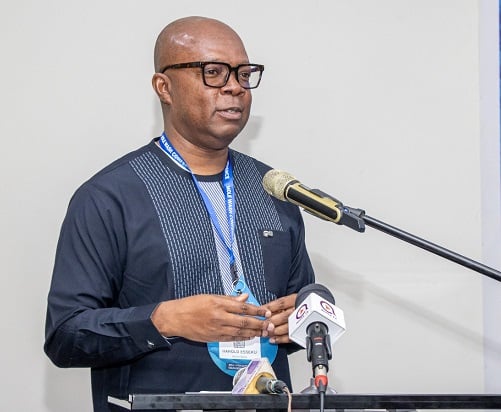At the MOLEXXXV conference organized by the Ghana Coalition of NGOs in Water and Sanitation (CONIWAS), Senior Water and Sanitation Specialist at the World Bank Ghana, Ing. Harold Esseku, identified critical steps necessary for advancing the Water, Sanitation, and Hygiene (WASH) sector in Ghana. With the recent signing of the Presidential Compact on WASH, he urged the government to allocate a larger portion of its internally generated revenue towards funding WASH initiatives. Esseku emphasized the need for the WASH sector to adopt innovative financing mechanisms and explore non-traditional funding sources that prioritize equity and sustainability. The conference convened under the theme “Looking Back on SDG 6 Implementation in Ghana: Progress, Challenges, and Ways Forward,” aimed at highlighting the implementation of Sustainable Development Goal 6 (SDG6) and identifying pathways to overcome existing challenges.
During his remarks, Esseku highlighted several significant challenges facing the WASH sector in Ghana, including funding, regulatory frameworks, and information systems. He asserted that reliance on development partner funding is unsustainable, urging for a systemic change in how financial resources are sourced and allocated. Additionally, he stressed the importance of strengthening systems and regulatory frameworks within the sector. According to Eseku, effective planning and decision-making hinge on the existence of a robust Sector Information System (SIS), which he described as critical for accurate data-driven decision-making. He advocated for the integration of the SIS within district-level activities to ensure that stakeholders make informed decisions based on current and accurate data, rather than on subjective or political biases.
Moreover, he proposed that establishing clear performance benchmarks within the WASH sector can help measure progress and accountability among stakeholders. He emphasized the necessity to incorporate climate adaptation and resilience measures into planning processes, as the WASH sector must adapt to increasingly volatile climate conditions. He warned that without appropriate infrastructure resilience, communities could suffer significantly during adverse weather events. These proactive measures play a crucial role in achieving long-term sustainability rather than short-term fixes.
Esseku also raised the issue of enforcing existing regulations that influence sanitation and hygiene practices. While the laws required to support WASH initiatives are theoretically in place, he noted that social, cultural, and political factors often hinder their effective implementation. Local governments, especially Environmental Health Officers, hold a vital role in enforcing sanitation laws and promoting hygiene practices. Empowering these local officers will enhance the oversight of both formal water suppliers and informal providers, all of whom contribute to the WASH ecosystem in Ghana. Esseku acknowledged the positive strides made by the Water Resources Commission (WRC) in managing groundwater resources, while also pointing out the serious challenges posed by illegal mining activities that threaten water quality and availability.
Professor Simon Mariwah underscored the dire public health implications of inadequate WASH access in Ghana, revealing that WASH-related diseases claim thousands of lives annually. World Health Organization statistics indicated that in 2019 alone, approximately 7,635 deaths were attributed to WASH-related issues in Ghana, highlighting a glaring need for improved access to clean water and sanitation facilities. Mariwah emphasized the vast disparities in WASH access across different communities, which is often influenced by socio-economic and demographic factors. He described these disparities as “health inequities” that must be addressed to ensure that all communities, particularly the underprivileged, can access essential WASH services, thereby affirming their health and dignity.
GENOWAS, alongside several other organizations and experts, actively participated in the MOLEXXXV Conference, highlighting the collaborative efforts necessary to drive forward the WASH agenda in Ghana. Ms. Beata Awinpoka Akanyani, Chairperson of CONIWAS, reinforced the critical link between effective WASH initiatives and the broader Sustainable Development Goals, which encompass public health, economic growth, and social equity. The display of various WASH-related projects and initiatives throughout the conference underscored the importance of stakeholder engagement in addressing WASH challenges in Ghana.
In summary, the discussions led by Ing. Harold Esseku and supported by various stakeholders at the MOLEXXXV conference illuminated the pressing issues and potential solutions in the WASH sector of Ghana. The call for increased government funding and innovative financing, along with improved regulation and planning, laid out a clear vision for advancing WASH services. With the health and wellbeing of countless Ghanaians at stake, the commitment to address these challenges collaboratively can pave the way for a more equitable and sustainable future for WASH in Ghana.














